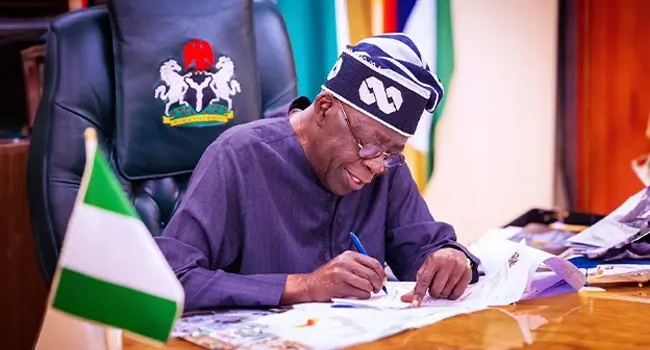President Bola Tinubu on Wednesday posthumously conferred the national honour of Commander of the Order of the Niger (CON) on four late Ogoni leaders, Albert Badey, Edward Kobani, Theophilus Orage, and Samuel Orage, collectively known as the Ogoni Four.
The announcement was made during the presentation of the Ogoni Consultations Committee report at the State House, Abuja.
Urging the Ogoni people to embrace reconciliation and unity after decades of division, Tinubu said, “May their memories continue to inspire unity, courage and purpose among us. I urge the Ogoni people across classes, communities and generations to close ranks, put this dark chapter behind us and move forward as a united community with one voice.”
The meeting came 16 months after the President vowed in May 2024 to diligently pursue the cleanup of Ogoniland and increase empowerment opportunities for its indigenes. He reaffirmed his commitment to unlocking Ogoniland’s human and natural resource potential, while ensuring environmental and economic security for Nigerian communities.
READ ALSO: Ogoni stakeholders laud Tinubu for establishing varsity, demand speedy oil exploration action
President Tinubu assured stakeholders that his administration would support peace, environmental remediation, and economic revival in Ogoniland, including facilitating the return of oil exploration. “I am encouraged by the overwhelming consensus of the Ogoni communities to welcome the resumption of oil production. The government will deploy every resource to support your people in this march towards shared prosperity,” he said.
Citing the 2022 transfer of Ogoni oil field operations to the Nigerian National Petroleum Company Limited (NNPCL) and its partners under the previous Buhari administration, Tinubu pledged to honour and build on this decision.
He directed the National Security Adviser, Nuhu Ribadu, to engage with Ogoni communities, NNPCL, partners, and relevant stakeholders to finalise modalities for restarting operations. Tinubu stressed, “A dead asset is not valuable to the community, the country or the people. The longer we procrastinate, the worse it is for everyone.”
The Minister of Environment was also instructed to integrate pollution remediation and environmental recovery efforts into the dialogue framework.
Nuhu Ribadu, who presented the report, confirmed extensive consultations across Ogoni zones with local communities, traditional leaders, and the diaspora. He emphasised the commitment of his office and government agencies to restoring peace in Ogoniland and ensuring full implementation of the President’s directives.
Prof. Don Baridam, Chairman of the Dialogue Committee, noted that the report represents the collective will of the Ogoni people, capturing demands for structured participation in oil production, renewed environmental cleanup, and sustainable development frameworks.
Oil was first commercially discovered in Oloibiri, Ogoniland, in 1958 but exploration ceased in 1993 following protests against environmental degradation.
The Ogoni Four were murdered in May 1994 amid the activism of Ken Saro-Wiwa’s Movement for the Survival of the Ogoni People, which campaigned against oil companies and the Nigerian state’s harmful exploitation.
Their deaths and the subsequent execution of Saro-Wiwa and other activists in 1995 remain a painful chapter in Nigeria’s history.



